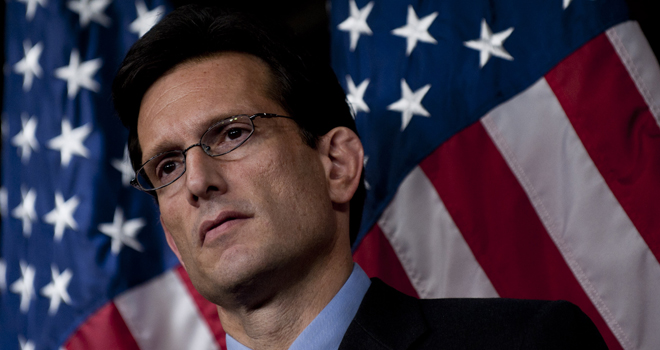Faced with growing criticism Tuesday, including from members of his own party, House Majority Leader Eric Cantor (R-VA) appeared to soften, slightly, his general view that federal disaster relief should be offset with equal or greater budget cuts.
He told the Richmond Times-Dispatch, that relief funds would not get bogged down in the sort of protracted budget fight that has dominated Congressional politics all year. His spokesman Brad Dayspring, in a statement to several reporters, echoed this. “People and families affected by these disasters will certainly get what they need from their federal government,” he said. “The goal should be to find ways to pay for what is needed or to find offsets whenever possible, that is the responsible thing to do. Clearly when disasters and emergencies happen, people expect their government to treat them as national priorities and respond properly. People also expect their government to spend their dollars wisely, and to make efforts to prioritize and save when possible.”
That will come as welcome news to victims and FEMA alike, if it turns out that they need Congress to pass emergency legislation in the aftermath of Hurricane Irene.
Mark Merritt, a former senior FEMA official in the Clinton administration said these kinds of budget impasses can be a big drag in a disaster management situation.
“It happened when we were there,” Merritt told TPM in an interview Tuesday. “They’ve addressed offsets before, and unfortunately offsets were from [Housing and Urban Development] money–community development block grants–which are a good tool for recovering from disaster…. Is anybody vehemently opposed to offsets? No. But they need to make sure that if they do them that, one, it happens quickly and, two, it doesn’t come from programs that help recovery.”
Not everyone agrees. Former George W. Bush FEMA director Michael Brown gave a thumbs-up to offsetting on Tuesday. TPM reached out to Brown’s successor Robert Paulison, but he declined to comment through a spokesperson.
Regardless, it’s a tall order given today’s gridlock. Many members of Congress believe the budget’s already stretched too thin, and those who don’t nonetheless disagree amongst themselves about what can and should be cut.
“Do it in a way that it doesn’t get drawn out the way it did in the debt ceiling,” Merritt implored. “Congress has never not stepped up for any community that’s needed it.”
It’s still unclear whether that will be necessary vis-a-vis Irene. FEMA still has just under $1 billion in its fund, and could see that grow to nearly $4 billion, split between 2011 and 2012, if the House and Senate can agree on Homeland Security appropriations bill this month.
But if there’s an appropriations logjam — and particularly if another costly disaster strikes — then Congress will need to act quickly to pass an emergency spending bill, without resorting to brinksmanship.
It’s still not clear how much, if any, federal disaster relief coastal states will need after Hurricane Irene, but GOP leaders are prepared to make sure it’s all offset with spending cuts only. According to Merritt, the costs of these disasters is split between what’s known as Immediate Needs Funding (INF) and permanent restoration costs — the difference between paying a firefighter overtime to rescue a family from a burning building, and then helping the city restore that building.
What FEMA’s done, according to Merritt, is say “we’re going to stop on the long-term stuff, and it’s going to be difficult and painful for those communities trying to recover from [earlier] storms, but we have to because otherwise we won’t have enough money in the pot [for current emergencies].”
Shimmying around funds is tough and unpopular and can’t work forever, and we’ll probably find out soon what happens when Congress has to step in.
Get the day’s best political analysis, news and reporting from the TPM team delivered to your inbox every day with DayBreaker. Sign up here, it takes just a few seconds.










